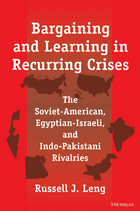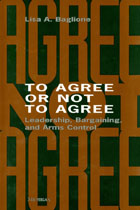2 books about Bargaining

Bargaining and Learning in Recurring Crises
The Soviet-American, Egyptian-Israeli, and Indo-Pakistani Rivalries
Russell J. Leng
University of Michigan Press, 2000
The rivalries between the Soviet Union and the United States, Egypt and Israel, and India and Pakistan produced twelve major crises and seven wars during the quarter-century following World War II. A disproportionate share of international crises and wars occur between long-term rivals. Why could not the leaders of these states learn to manage their disputes without severe crises or war? Russell J. Leng finds that the lessons leaders of those states drew from their experiences most often led to bargaining tactics that only increased the level of hostility and the likelihood of war in subsequent disputes.
The author uses theoretical work on learning and the role of belief systems on foreign policy-making as the basis to explore the history of each rivalry. Detailed narrative accounts of each of the crises are augmented by tables and figures describing the escalation of each crisis and the behavior of participant states. The approach allows for comparisons of behavior and learning across the three rivalries, as well as a consideration of the influence that the Soviet-American rivalry exerted on the Middle East and South Asian rivalries. The concluding chapter illustrates how the influence of realpolitik beliefs on learning across the three rivalries predisposed policymakers to draw lessons from their crisis experience that weakened conflict management in subsequent crises. The author also shows how superpower mediation in Middle East and South Asian crises and wars had the perverse effect of encouraging greater risk-taking by the participant states in subsequent crises.
The book will be of particular interest to political scientists and historians who study international relations, as well as those interested in decision-making and learning by policymakers.
Russell J. Leng is Professor of Political Science, Middlebury College, and the author of Interstate Crisis Behavior 1816-1980: Realism versus Reciprocity and numerous articles.
The author uses theoretical work on learning and the role of belief systems on foreign policy-making as the basis to explore the history of each rivalry. Detailed narrative accounts of each of the crises are augmented by tables and figures describing the escalation of each crisis and the behavior of participant states. The approach allows for comparisons of behavior and learning across the three rivalries, as well as a consideration of the influence that the Soviet-American rivalry exerted on the Middle East and South Asian rivalries. The concluding chapter illustrates how the influence of realpolitik beliefs on learning across the three rivalries predisposed policymakers to draw lessons from their crisis experience that weakened conflict management in subsequent crises. The author also shows how superpower mediation in Middle East and South Asian crises and wars had the perverse effect of encouraging greater risk-taking by the participant states in subsequent crises.
The book will be of particular interest to political scientists and historians who study international relations, as well as those interested in decision-making and learning by policymakers.
Russell J. Leng is Professor of Political Science, Middlebury College, and the author of Interstate Crisis Behavior 1816-1980: Realism versus Reciprocity and numerous articles.
[more]

To Agree or Not to Agree
Leadership, Bargaining, and Arms Control
Lisa A. Baglione
University of Michigan Press, 1999
Why were the leaders of the United States and the Soviet Union able to negotiate a series of arms control agreements despite the deep and important differences in their interests during the Cold War? Lisa A. Baglione considers a variety of explanations for the successes--and failures--of these negotiations drawn from international relations theories. Focusing on the goals and strategies of individual leaders--and their ability to make these the goals and strategies of their nation--the author develops a nuanced understanding that better explains the outcome of these negotiations. Baglione then tests her explanation in a consideration of negotiations surrounding the banning of above-ground nuclear tests, the Strategic Arms Limitation Talks of the 1970s, the negotiations for the limitation of intermediate-range nuclear forces in the 1980s, and the last negotiations between the Americans and the disintegrating Soviet Union in 1990 and 1991. How these great rivals were able to negotiate significant arms control agreements not only will shed light on international relations during an important period of history but will help us understand how such agreements might develop in the post-Cold War period, when arms proliferation has become a serious problem.
This book will appeal to scholars of international relations and arms control as well as those interested in bargaining and international negotiations and contemporary military history.
Lisa A. Baglione is Assistant Professor of Political Science, St. Joseph's University.
This book will appeal to scholars of international relations and arms control as well as those interested in bargaining and international negotiations and contemporary military history.
Lisa A. Baglione is Assistant Professor of Political Science, St. Joseph's University.
[more]
READERS
Browse our collection.
PUBLISHERS
See BiblioVault's publisher services.
STUDENT SERVICES
Files for college accessibility offices.
UChicago Accessibility Resources
home | accessibility | search | about | contact us
BiblioVault ® 2001 - 2024
The University of Chicago Press









